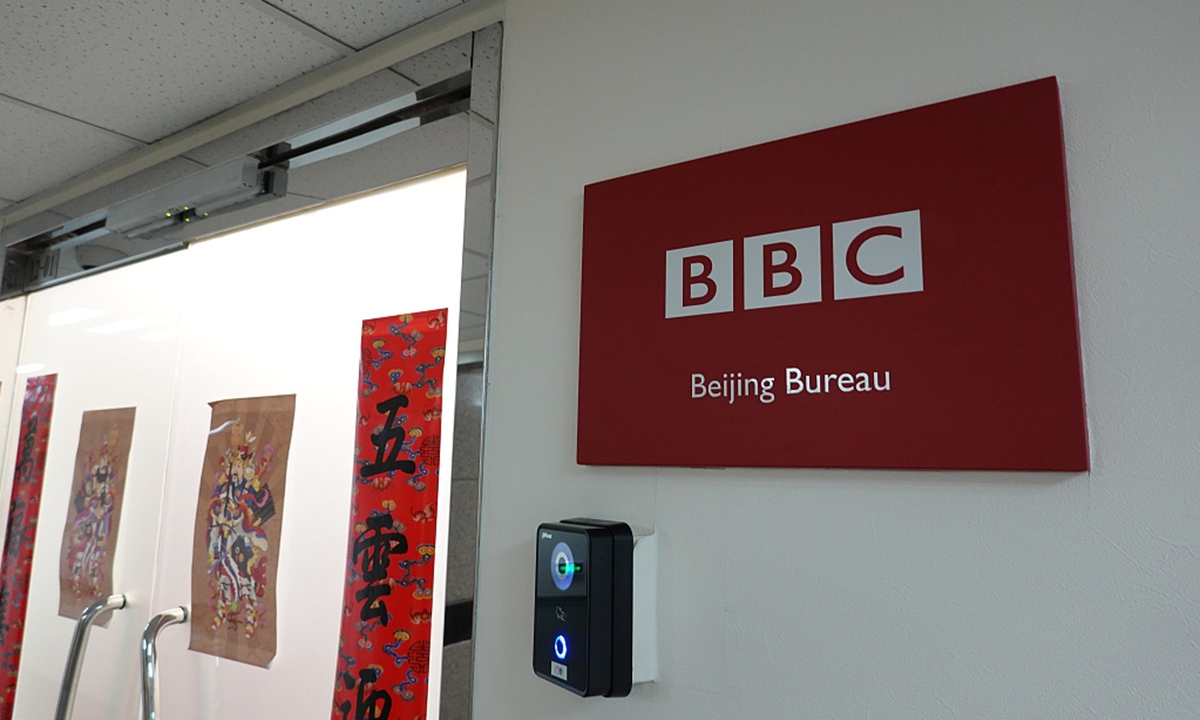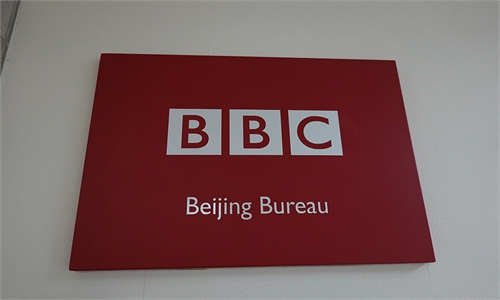Embassy, observers defend China's BBC license decision as legitimate, reasonable, 'further countermeasures to follow'

BBC Beijing Bureau Photo: VCG
The Chinese embassy in the UK firmly defended China's decision to bar the BBC World News from airing in China, saying the move is "legitimate and reasonable" given the British broadcaster's relentless fabrication of "lies of the century" in reporting China.
Chinese observers said the move could be part of China's countermeasures and not the only or final action against BBC's anti-China public opinion campaign if the broadcaster does not correct its practice.
The comments came after British Foreign Minister Dominic Raab said on Thursday China's decision to ban the BBC World News channel was unacceptable and accused China of curtailing of media freedom.
"BBC's relentless fabrication of 'lies of the century' in reporting China runs counter to the professional ethics of journalism, and reeks of double standards and ideological bias, causing strong indignation among the Chinese people," a spokesperson of the Chinese Embassy in the UK said in a statement on Friday.
"The so-called 'media freedom' is nothing but a pretext and disguise to churn out disinformation and slanders against other countries," the spokesperson said, noting that the Chinese top broadcasting regulator's decision is legitimate and reasonable.
We urge the BBC to abandon the Cold War mentality, stop fabricating and spreading disinformation, stop unfair, biased and irresponsible reporting, stop malicious attacks and smearing against the Communist Party of China and the Chinese government, and take concrete actions to remove the adverse impact of its related reports, the spokesperson said.
China's National Radio and Television Administration (NRTA) announced Thursday midnight, the Chinese New Year's Eve, that BBC World News was barred from airing in China since Friday, the first day of the Chinese New Year.
It also said any application from BBC for renewing its license will not be accepted for one year.
The decision has been made due to some of the BBC's reports on China that have infringed the principles of truthfulness and impartiality in journalism.
The ban on the BBC is one of China's countermeasures, but not the only or the last action, analysts said in an article released by the WeChat public account affiliated to the Commission for Political and Legal Affairs of the Communist Party of China (CPC) Central Committee on Friday.
The NRTA's decision to ban the BBC has sent a clear message that China does not accept fake news and BBC's rumors against China are part of the anti-China rhetoric war against China by some Western anti-China forces, analysts said.
Li Haidong, a professor at the Institute of International Relations of the China Foreign Affairs University, told the Global Times that it is possible that China will take further retaliatory measures, depending on whether the BBC will correct its wrongs, and stop distorting issues such as Hong Kong, Taiwan and Xinjiang.
If not, China is likely to expel BBC journalists based in Chinese mainland, according to Li. "Expelling journalists is a reasonable move, because if journalists fail to report on China objectively, kicking them out is the right thing to do," said Li.
On Friday, Radio Television Hong Kong (RTHK), the public broadcasting service in Hong Kong said in a statement that it would stop relaying the BBC World Service from 11pm on Friday. The live relay used to run from 11pm every night until 7am the following day.
"There is nothing about 'independence' or professional journalism in the BBC's reporting on China as it has been funded by the UK government and needs to cooperate with politicians," said Zhao Chen, a research fellow at the Institute of European Studies under the Chinese Academy of Social Sciences.
Zhao said that the BBC has been under dual pressure recently - limited government grants due to the influence of the COVID-19 pandemic and the fierce competition to win audiences.
BBC's recent biased reports on China, either on Xinjiang governance or the once epidemic-hit Wuhan, have drawn fierce criticism in China. On China's Twitter-like platform Sina Weibo, BBC's reports were often laughing stock for their biased and double standard reporting.
Many netizens in China and overseas also applauded the moves to bar the BBC in China. "Good for the Chinese people, they don't have to listen to any British propaganda," a netizen named Victor Sierra commented on Twitter.
Given its biased coverage, even the UK audience does not favor the content of the British broadcaster.
A majority of the public no longer want to pay the BBC license fee and the impartiality of the broadcaster is in grave doubt, according to exclusive research, express.co.uk reported.
Almost half of people (47 percent) surveyed said the BBC has failed to be impartial in its news coverage in recent years, the report said, citing the survey.
Global Times


